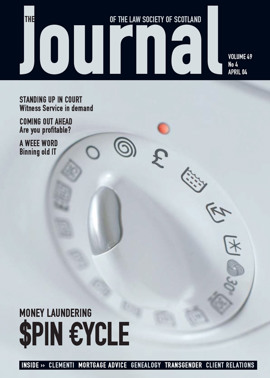Vibrant and in good heart
The age of communication
The Journal has changed dramatically over nearly 50 years of publication. As President, John Elliot set the Journal on a course of change and colleagues and constituents have left me in no doubt that it is much more widely read than ever – because it is more relevant to practitioners. There are many more legal periodicals available now than in 1956 but the Journal is about more than just reporting on the law and the Society’s view. Douglas Mill’s articles about the future of our profession, with the Clementi banner, exemplify the Journal working to communicate the profession’s views and report on legal issues, news and practice.
On the subject of communication, the Chief Executive, the Vice President and I have travelled the length and breadth of Scotland to talk with the profession first-hand. It is that communication and involvement which will inform the response to the Clementi review which will be put before the Society’s AGM on 13 May at Edinburgh’s Royal Museum. The Executive and Council are hoping for a good turnout to debate the issue.
Faculty visits have been, for me, among the most pleasurable aspects of my year as President. The debates are lively, challenging and often exciting. Despite diehard perceptions, the solicitors’ profession is a vibrant one full of bright, interested, able people. We love a good debate and can address issues from our own point of view, from our client’s perspective and with a clear understanding of the public interest. The only downside is that the faculties often invite Douglas and me for a game of golf and take great delight in thumping us on their home courses. It saddens me that there are some who question solicitors’ independence. Not once have I seen any favours on a golf course and that’s in leisure time! I console myself with the fact that visits from the Guarantee Fund inspectors to the victors’ firms can’t be far off.
What is also encouraging is that the faculties are in such good heart. Leaving aside (but only briefly) the very real problems affecting legal aid and its practitioners like me, there is no doubt that solicitors’ ability to adapt, to meet their clients’ needs and to structure their businesses wisely means that they thrive.
Power and its limits
I sincerely hope that May’s AGM meets with the same success as the Society’s conference in March on preventing money laundering. The SECC was full to capacity and Update did their best to accommodate a long waiting list. It was the largest number of Scottish solicitors – 625 – ever gathered in one room (unless anyone can tell me otherwise). The profession is to be credited for taking this matter so seriously.
The speakers included the Lord Advocate and the Attorney General. Their willingness to give their time was very heartening. The Attorney General was called to give evidence to the Butler Inquiry on the same morning. It would have been easy for him to cancel; but he reorganised and instead of opening the conference, arrived in time to give the closing speech. It is usual for politicians, like lawyers, to be denigrated but just as we bring credit to our profession by carrying out our obligations to our clients, Lord Goldsmith showed that he retains an unshakable commitment to the legal profession in spite of the pressures of public office.
The profession’s concerns about the regulations were well aired and came to the fore again during the Law Society of Northern Ireland conference in Peebles in March. We learned that a disturbingly low figure, less than 3% of the estimated proceeds of crime has been recovered by NCIS. The money laundering legislation was established as essential measures to stop terrorism and organised crime, but if it turns out to be effective only in preventing tax and VAT evasion it must be reviewed. Tax evasion is a serious offence but was already covered by perfectly adequate legislation. The new powers must never be used for this purpose alone.
The liberty of UK citizens is not protected by the comfort of living in a democracy; liberty is about ensuring that democracy’s pillars are upheld. Society has to ask serious questions about the authority of the state and the fact that the Human Rights Act has been rapidly followed by legislation which many believe flies in the face of civil liberties.
Lest we think we are alone in our concerns, I notice that the Scotch Whisky Association is complaining about “draconian” measures to procure even more tax from their industry. This highlights again just how much tax there is on a bottle of whisky. As someone who has always believed in supporting Scotland’s most important indigenous industry I really can hold my head high and say, “I paid my way”.
In this issue
- Vibrant and in good heart
- Terms of endearment
- Coming out brighter
- New model army
- Offices of profit
- When girl meets boy
- A question of identity
- Going for a WEEE? Think again
- Roadshow ahead
- Putting theory into practice
- Witnessing a new dawn
- Far from incidental
- Dealing with a fact of life
- Contempt with impunity?
- Winding up the Europeans
- Green light for Nature Bill?
- Website reviews
- Book reviews
- Keeper's Corner
- The new law of real burdens
- Housing Improvement Task Force






